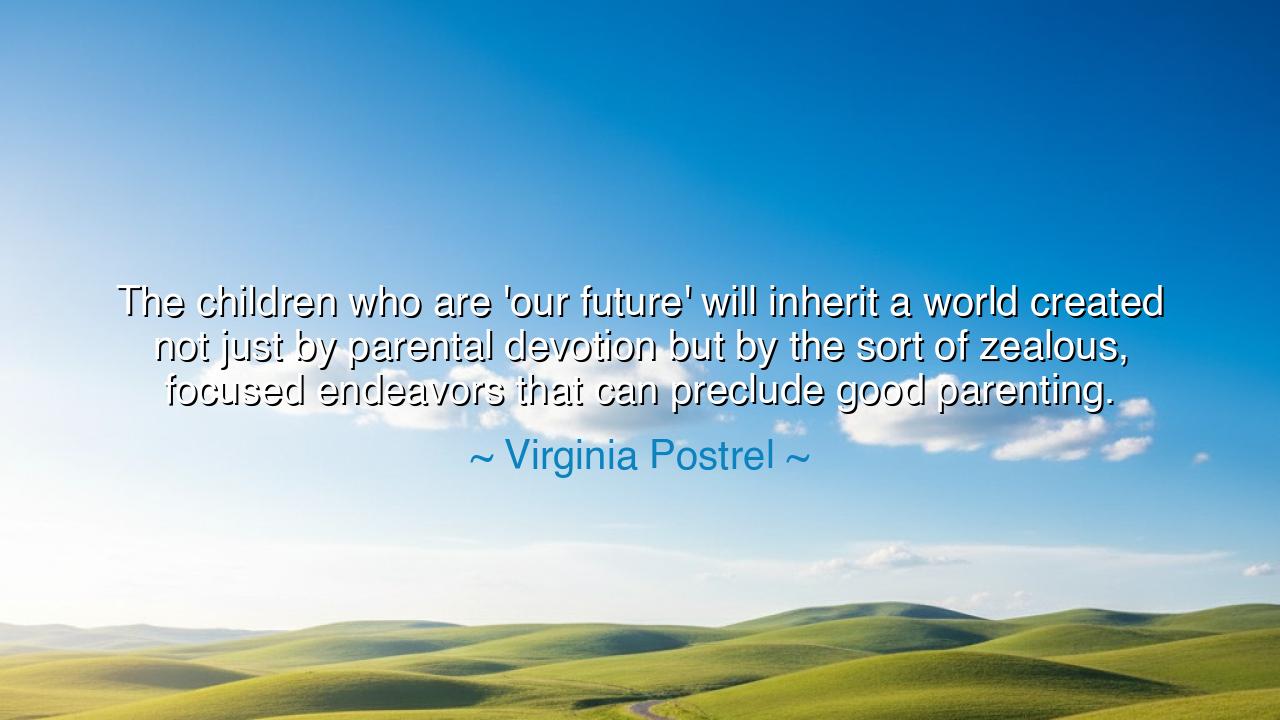
The children who are 'our future' will inherit a world created
The children who are 'our future' will inherit a world created not just by parental devotion but by the sort of zealous, focused endeavors that can preclude good parenting.






Hearken, O seekers of wisdom, to the penetrating insight of Virginia Postrel, who casts her gaze upon the delicate tension between parental devotion and the consuming force of worldly ambition. She observes that while the children of today are heralded as “our future,” their inheritance is shaped not solely by the gentle hands and hearts of guardians but also by the fervent zeal and focus of endeavors that can, in their intensity, eclipse the tender duties of parenting. Herein lies an ancient paradox: the toil that shapes the world can simultaneously distance us from the intimate labor of raising souls, reminding us that greatness in one realm may demand sacrifice in another.
The origin of this insight is rooted in the interplay of human ambition and familial obligation. Across the annals of history, those who have pursued visionary endeavors—be it the founding of cities, the crafting of empires, or the creation of enduring works of art—have often found themselves torn between public duty and private care. Postrel’s reflection echoes the wisdom of the ancients, who taught that balance is the axis upon which human fulfillment turns. The commitment to a larger purpose, while noble, may exact a hidden toll on the tender hearts that depend upon the presence of the parent.
Consider the life of Thomas Jefferson, whose profound contributions to the shaping of a nation were monumental, yet whose devotion to his children was often constrained by the demands of governance, invention, and estate. His legacy, radiant in the annals of history, was forged through relentless focus, yet it unfolded alongside the quiet sacrifices of those domestic spheres he could scarcely attend. In such lives, we perceive the truth Postrel imparts: the world may be crafted by zeal and vision, but the intimate shaping of young hearts may be compromised by the very energies that achieve greatness.
The emotional resonance of her observation strikes at the heart of human striving. To pursue one’s calling with passion is a noble endeavor, yet it carries the weight of awareness that those who depend upon us—our children—may bear the subtle cost of our absence. This is no indictment of ambition but a sober acknowledgment that parenting is a labor that requires presence, patience, and devotion. The most ardent work in the world is not a substitute for the quiet, continuous engagement with the young, whose development flourishes in the soil of attention and love.
Yet Postrel’s words do not counsel the abandonment of ambition. Rather, they illuminate the necessity of conscious choice and deliberate allocation of attention. The parent who pursues greatness must do so with mindfulness, recognizing that the nurturing of children and the pursuit of extraordinary endeavors are parallel callings, each demanding careful attention. The ancients understood this duality: the hero who conquers kingdoms must not forget the hearth, for the continuity of virtue and civilization rests upon both.
From this understanding arises a practical lesson: balance and intentionality are the keystones of responsible life and parenting. Those who are driven by vision must craft structures that allow their presence in the lives of the young, whether through shared rituals, consistent communication, or the creation of environments in which the child feels supported even in the parent’s absence. To neglect this is to risk leaving a world rich in achievement but impoverished in the bonds that nurture integrity, empathy, and resilience.
Moreover, Postrel’s reflection urges us to consider the legacy we bequeath—not only in monuments and accomplishments but in the formation of hearts, minds, and souls. Conscious parenting need not conflict with ambition if approached with foresight, care, and attention to presence. By embedding the young in an environment where they are seen, heard, and cherished, one ensures that the world they inherit is rich not only in opportunity but in the wisdom and love that sustain it.
Thus, the teaching of Virginia Postrel endures across time: the future of humanity is shaped as much by the intimate devotion of the parent as by the grand labors of the visionary. Let all who labor in pursuit of greatness temper their zeal with attentiveness, presence, and compassion. In doing so, they craft a legacy that encompasses both achievement and nurture, honoring the sacred duality of human life: that the hearts we raise today are the architects of the world tomorrow.






AAdministratorAdministrator
Welcome, honored guests. Please leave a comment, we will respond soon